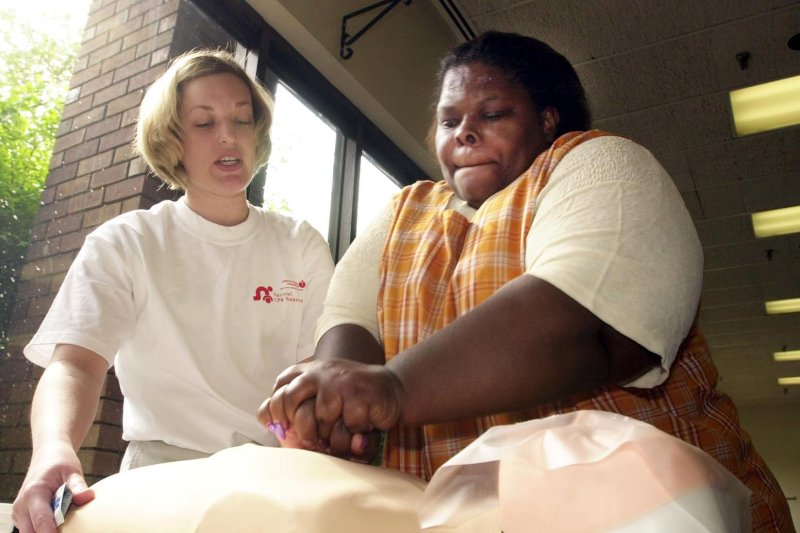Knowing CPR can help save a persons life. Researchers said administering the technique improves survival chances outside the hospital, but relying on artificial intelligence for guidance is risky. File photo by Bill Greenblatt/UPI |
License Photo
Aug. 28 (UPI) -- Administering cardiopulmonary resuscitation outside of a hospital setting increases the chance of survival, though research published Monday finds that it can be risky for those not already trained in CPR to rely on artificial intelligence for guidance.
Concerned that potential non-medical rescuers might not get all the information they need to perform CPR, researchers at Mass General Brigham, New York's Albert Einstein College of Medicine and Boston Children's Hospital looked at how artificial intelligence as it relates to the life-saving measures.
"They found that the directions provided by voice assistants lacked relevance and came with inconsistencies," the report in JAMA Network Open showed. This, the study indicated, could frustrate and confuse bystanders tasked with trying to save a life.
Researchers posed eight verbal questions to four voice assistants -- Amazon's Alexa, Apple's Siri, Google Assistant's Nest Mini, and Microsoft's Cortana. They also typed the same queries into ChatGPT. All responses were evaluated by two board certified emergency medicine physicians.
According to the results, nearly half of the responses from the voice assistants were unrelated to CPR, such as providing information related to a movie called CPR or a link to Colorado Public Radio News. Only 28% suggested calling emergency services.
In addition, only 34% of the responses provided CPR instruction and 12% provided verbal instructions.
Researchers said ChatGPT provided the most relevant information for all queries among the platforms tested.
Based on these findings, the authors concluded that use of existing AI voice assistant tools may delay care and may not provide appropriate information.
They noted that limitations to this study included the asking of a small number of questions and not characterizing if the voice assistants' responses changed over time.
"Our findings suggest that bystanders should call emergency services rather than relying on a voice assistant," said senior author Adam Landman, the chief information officer and senior vice president of digital at Mass General Brigham and an attending emergency physician.
"Voice assistants have potential to help provide CPR instructions, but need to have more standardized, evidence-based guidance built into their core functionalities."
AI has already shown promise in everything from mammograms to the coronavirus that causes COVID-19. Scripps Research said last month that its scientists have developed a machine-learning system that could help track the evolution of epidemic viruses and predict the emergence of variants.
They said the system could have predicted the emergence of new coronavirus "variants of concern" ahead of their official designations by the World Health Organization.















